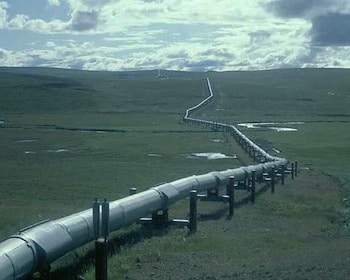Will the turmoil in the Middle East surrounding Syria expedite approval of the Keystone XL pipeline? North Dakota Republican Senator John Hoeven believes it will.
Hoeven, an ardent supporter of the pipeline, recently told a North Dakota newspaper, “Right now, we’re determining how to respond in the Middle East, specifically Syria, and it shows, with the volatile situation there, how important it is that we can produce our own energy in North America and not have to get it from the Middle East.”
Hoeven teamed up with Louisiana Democrat Mary Landrieu earlier this week to introduce a resolution that claims that the Keystone XL pipeline is in the best national interest of the United States.
The three single largest campaign contributors to John Hoeven’s political career have all been energy companies, and the dirty energy sector represents Hoeven’s largest industry from which his campaign money is delivered.
Hoeven’s beliefs about the pipeline are completely misguided. He is peddling the idea that the oil being transported from Canada to the Gulf Coast will be sold right here in America. However, he misses the fact that the pipeline will travel past all of the Midwest U.S. oil refineries – refineries that primarily are used for oil that stays in the United States – and instead it ends up in one of the main U.S. export waterways, the Gulf of Mexico.
Independent analysis has shown that the reason the oil will be transported to the Gulf Coast is that it is meant to be shipped overseas to developing markets. This shoots down Hoeven’s talking points about relying on “home grown” energy sources.
Even if we were to operate under the assumption that the tar sands oil from Keystone XL would stay in the United States, there is absolutely no research that shows that it would help American consumers ease their pain at the gas pumps. Quite the contrary appears to be true, actually. Back to the American Midwest – oil refiners in the area have been importing Canadian tar sands for several years because it is cheaper, and it is being sold domestically. However, rather than passing their savings along to consumers, oil companies like BP and Koch Industries are hoarding the access cash as a windfall, while leaving prices at the pump hovering around the national average. So even if Hoeven was telling the truth about the Keystone XL, which he is not, it wouldn’t change our situation one bit.
But there is a bigger problem that could stem from Hoeven’s way of thinking. Tensions and conflict in the Middle East both typically drive energy prices upwards, and the current situation in Syria has been no exception. And if short-sighted members of Congress are already using the situation to push for the Keystone XL pipeline’s approval, its only a matter of time before they branch out into other projects.
Over in Europe, energy investors are frothing at the mouth over the opportunities that are presenting themselves. They understand that conflict in the Middle East will give them the perfect opportunity to push for increase domestic dirty energy production from methods like hydraulic fracturing.
Oil executives are exploiting the fears of Europeans and claiming that dirty energy from increased shale gas extraction and oil drilling will easily be able to keep their countries running if a Middle East war creates a sudden drop in energy imports. It’s a clever strategy, but the energy industry has absolutely no intention of simply stepping in if a shortage occurs and then backing off once oil supplies resume – their long game is to get their rigs pumping and never shut them off until they run dry.
Thinking that the solution to the problem lies in sources of energy that exacerbate climate change completely ignores the reality that climate change actually helped cause the problem in the first place.
As predicted in Al Gore’s Emmy-winning documentary An Inconvenient Truth, climate change has led to displacement, social unrest, and food shortages in Syria, with the problem coming to a head early last year. The country had experienced more than five consecutive years of droughts and crop failures, and the government turned a blind eye to those in need, creating the social unrest and uprisings that prompted the recent government action against the Syrian people.
And Syria could just be the first in what is to become a long term fight over resources. According to studies, violent uprisings resulting from the affects of climate change are expected to increase by as much as 50% by the year 2050.
Increasing our dependence on dirty energy will do nothing to solve the problems that the world is facing, as people like John Hoeven would like us to believe. All of the available research shows that it will only make the problem worse for all of us. Using a tragedy like Syria to help boost the dirty energy industry’s profits is appalling, and so is the industry’s efforts to take advantage of the fears that come along with it.
Subscribe to our newsletter
Stay up to date with DeSmog news and alerts






